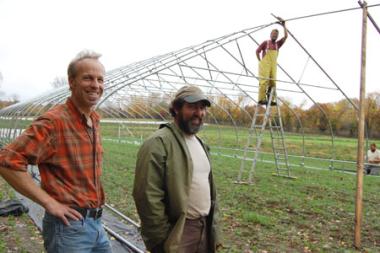Ted White met me at the Simple Gifts farm in North Amherst on a gray morning last week, just after a torrential downpour. It turned out we’d both been worried about how photogenic the farm would be, but in the bursts of light now breaking through the clouds, the thoroughly soaked fields positively glowed.
I’d emailed the North Amherst Community Farm to ask about what being a community farm was like, and the nonprofit’s one paid staff member, executive director Teresa Fitzsimmons, recommended founding board member Ted White. He’s a Ph.D. candidate in economic geography at UMass-Amherst, and the dissertation he’s working on is titled “Seeds of a New Economy? Diverse Economic Practices and Community Supported Agriculture in the Pioneer Valley of Massachusetts.” He appeared to be my man.
Many of the farmlands north of the UMass-Amherst campus have been bought up and subdivided as housing. Some of it is repetitive, no-frills, low-income housing, some of it spare but artful co-housing. All the new developments are in stark contrast with the farmhouses and Victorian homes that have been there the better part of a century.
Just off North Pleasant Street and behind an old white farmhouse is a long, narrow rectangle of farmland that disappears over a distant hilltop where cattle graze. Ted White explained that the house by the road provided a home for the several apprentices that helped farm the land.
To the side of the dirt road that runs the length of the land, he showed me the renovated distribution shed. Translucent windows had been installed in the side of the long barn to offer natural lighting and the roof sported new solar panels. White said that the panels would provide more than enough energy to meet the needs of the large shed, which included a walk-in freezer.
Across the way, amongst the damp orange autumn leaves, hoop houses kept budding crops of lettuce dry, warm and green. Up the road we met Jeremy Barker-Plotkin, one of the two farmers the fundraising entity chose to run the farm. He specializes in vegetable production, while the other farmer, David Tepfer, oversees the livestock operation and upkeep of the physical plant. They both live in homes adjacent to the farm, but on the opposite end from the apprentice housing. Tepfler’s partner, Marcy Lowry, is a veterinarian. Audrey Barker-Plotkin, Jeremy’s wife, is a forestry researcher at Harvard Forest, and was on the selection committee for the farmers to cultivate the Northampton Community Farm [see cover story “A New Neighborhood Farm“].
On that particular day, the two farmers were busy constructing a hoop house—a greenhouse with a metal tubing skeleton and a white plastic skin—that could be moved on rails. This, they explained, would allow them to raise budding plants off-season and expose them to the elements when they’re hardy enough to survive.
After several hundred yards of tilled and sprouting land, we came to the hilltop with the cattle. The grassy field, Ted White explained, was less fertile land and they used it mostly for grazing animals. It was also the site of a harvest festival they held in September. Even though the festival is free and open to anyone wishing to attend, it is their biggest and most successful fundraiser. Over a thousand people attend; there are local music, arts and crafts.
When the Dziekanowskis, the previous owners of what is now Simple Gifts, put their family farm up for sale in 2006, it was initially to be sold as another subdivision. The family wanted it to remain farmland, though, and they offered to reduce the asking price by $800,000 if the local nonprofit that was to become North Amherst Community Farm could raise the funds.
The initial funding efforts were successful, but while a thriving CSA occupies the property now, in 2014 a second land payment becomes due. This payment will cover the house and the stretch of land bordering North Pleasant Street. If the nonprofit is unable to make the payment, White points out that different owners would have a lien on the driveway and street access to the farm.
White looks to Grow Food Northampton’s (GFN) efforts to buy the Bean and Allard properties for a community farm in Northampton as inspiration for his farm’s continued fundraising challenges. Noting the design and polish of GFN’s print materials and website, he’s hopeful the energy Simple Gifts’ colleagues across the river have generated will help them draw support for their efforts.
“When I come here with my children, we always talk about coming to ‘our farm,'” White said. “We might say that about the local pharmacy we go to, or the local supermarket, but it feels different here. We feel the stake we have in it.
“Ever since I was a kid, I wanted to raise my family on a farm,” he said. “It was a dream of mine. But working on helping create this community farm, I’ve begun to realize this might be how I achieve that goal.”



